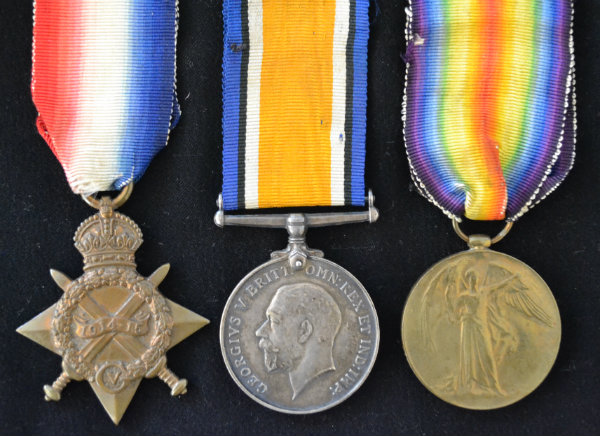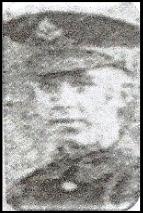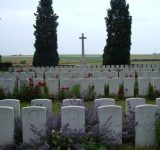Personal Details
George Alfred Chubb, born in Talbot Street, Whitchurch in 1887, the fifth son of Thomas and Elizabeth (Eliza) Chubb of 4, Park Road, Whitchurch.
in 1911, George was working as a Draper's assistant.
Military Details
Regiment : 1/10th (Territorial) Battalion The King’s (Liverpool Regiment) Liverpool Scottish
Rank : Sergeant
Service Number : 355435
Died of Wounds; France (Prisoner of War) 5th December 1917 Age 31

The 1914 Star (also known as 'Pip') was authorised under Special Army Order no. 350 in November 1917 and by an Admiralty Fleet Order in 1918, for award to officers and men of the British and Indian Expeditionary Forces who served in France or Belgium between 5 August and midnight of 22–23 November 1914. The former date is the day after Britain's declaration of war against the Central Powers, and the closing date marks the end of the First Battle of Ypres.
The 1914–15 Star (also known as 'Pip') was instituted in December 1918 and was awarded to officers and men of British and Imperial forces who served against the Central European Powers in any theatre of the Great War between 5 August 1914 and 31 December 1915. The period of eligibility was prior to the introduction of the Military Service Act 1916, which instituted conscription in Britain.
The British War Medal (also known as 'Squeak') was a silver or bronze medal awarded to officers and men of the British and Imperial Forces who either entered a theatre of war or entered service overseas between 5th August 1914 and 11th November 1918 inclusive. This was later extended to services in Russia, Siberia and some other areas in 1919 and 1920. Approximately 6.5 million British War Medals were issued. Approximately 6.4 million of these were the silver versions of this medal. Around 110,000 of a bronze version were issued mainly to Chinese, Maltese and Indian Labour Corps. The front (obv or obverse) of the medal depicts the head of George V. The recipient's service number, rank, name and unit was impressed on the rim.
The Allied Victory Medal (also known as 'Wilfred') was issued by each of the allies. It was decided that each of the allies should each issue their own bronze victory medal with a similar design, similar equivalent wording and identical ribbon. The British medal was designed by W. McMillan. The front depicts a winged classical figure representing victory. Approximately 5.7 million victory medals were issued. Interestingly, eligibility for this medal was more restrictive and not everyone who received the British War Medal ('Squeak') also received the Victory Medal ('Wilfred'). However, in general, all recipients of 'Wilfred' also received 'Squeak' and all recipients of The 1914 Star or The 1914/1915 Star (also known as 'Pip') also received both 'Squeak' and 'Wilfred'. The recipient's service number, rank, name and unit was impressed on the rim.
Further Information
Report in the Wellington Journal & Shrewsbury News December 1917 regarding the death of George Alfred Chubb
"Mrs Chubb, 4, Park Road, Whitchurch, has received warm expressions of sympathy in the death of her son, Sergeant George Alfred Chubb Age 31, of the Liverpool Scottish. He had been three years and five months at the front, with a total of 14 years in the Volunteers and Territorial’s and was a highly efficient soldier. At the out break of the war he was an assistant in the furnishing department at Compton House, Liverpool, and was highly esteemed by his colleagues there, as well as by his comrades in the Army"
Wellington Journal & Shrewsbury News December 1917
Taken from Forces War Records
If you can provide any further information on George Alfred Chubb please get in touch by leaving a comment below, using our Contact Form or by calling in to Whitchurch Heritage Centre.
Information provided by Terry Evanson Whitchurch, Shropshire and Whitchurch Museum and Archives


